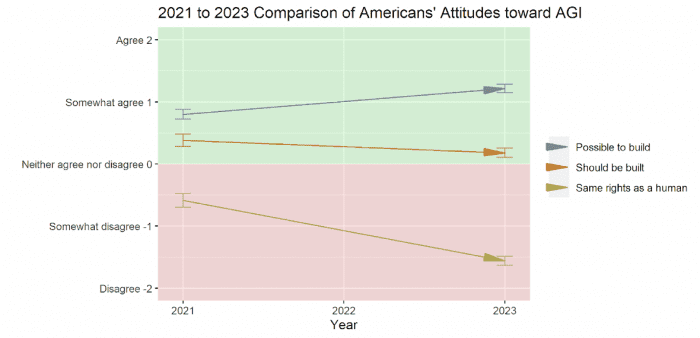SBU News: What does the American public really think of AI?

A Stony Brook University study suggests that on average, U.S. adults have gained confidence in the capabilities of AI and grown increasingly opposed to extending human rights to advanced AI systems.
In 2021, two Stony Brook University researchers – Jason Jones, PhD, Associate Professor in the Department of Sociology, and Steven Skiena, PhD, Distinguished Teaching Professor in the Department of Computer Science – began conducting a survey study on attitudes toward artificial intelligence (AI) among American adults. Some of their recent findings, published in the journal Seeds of Science, show a shift in Americans’ views on AI.
The researchers compared data collected from random, representative samples in 2021 and 2023 to determine whether public attitudes toward AI have changed amid recent technological developments – most notably the launch of OpenAI’s ChatGPT chatbot in late 2022. The new work builds on previous research into how AI is perceived in society, by way of the Jones-Skiena Public Opinion of Artificial Intelligence Dashboard and similar survey studies conducted with varying demographics.
The new study sampled two unique groups of nearly 500 Americans ages 18 and above, one of which was surveyed in March 2021 and the other in April 2023. Participants shared their opinions on the achievability of constructing a computer system able to perform any intellectual task a human is capable of, whether such a system should be built at all, and/or if that system – referred to as Artificial General Intelligence (AGI) – should be afforded the same rights as a human being.
Google Surveys was originally used as the platform for this research due to its capability of delivering random, representative samples.
“What we truly wanted to know was the distribution and average of public opinion in the U.S. population,” says Jones, co-author and also a member of Stony Brook’s Institute for Advanced Computational Science (IACS). “A random, representative sample is the gold standard for estimating that in survey research. Google shut down their Google Surveys product in late 2022, so we used another platform called Prolific to do the same thing for the second sample.”
Once the samples were collated, a statistically significant change in opinion was revealed regarding whether an AGI system is possible to build and whether it should have the same rights as a human.
In 2023, American adults more strongly believed in the achievability of AGI, yet were more adamantly against affording such systems the same rights as human beings. There was no statistically significant change in public opinion on whether AGI should be built, which was weakly favored across both samples.
Jones and Skiena stress that more studies must be conducted to better understand public perceptions of artificialintelligence as the technology continues to grow in societal relevance.
They will repeat the survey this spring with the same methods used in 2023 with the hope of building further on their findings.






